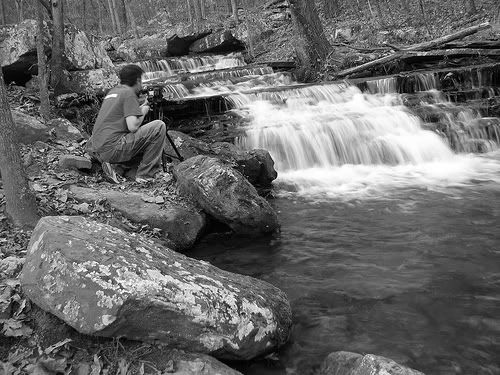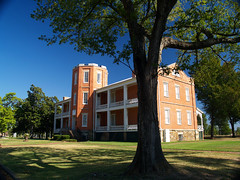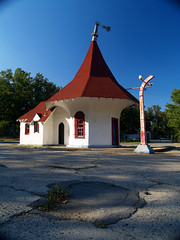After leaving work the plan was to head to Conway to meet a friend and head up and explore the area around Greers Ferry Lake. After getting stuck in traffic along the freeway, I finally made it to the meeting place: the new Whole Hog Cafe in Conway. A yummy BBQ sandwich might not be the best thing to load up on before sitting in the car for awhile, but it was good so no regrets...

The drive to Greers Ferry takes about an hour from Conway, and our first stop was Sugarloaf Mountain. The mountain sits right on the edge of Heber Springs and the Little Red River. There is a short trail that heads up the hill and ends at a rock formation at the top of the mountain.

The top of the mountain just really provided views of Heber Springs...so it was the tops of buildings and whatnot. We tried to make our way around the bluff to find a way to the other side, but really couldn't find a way though. There was one crack in the rock that someone had spraypainted "ENTER" with an area pointing up and below it "EXIT" with an arrow pointing to the ground. I took that to mean that you could possibly make your way through the break in the rock to the top, but would likely tumble down and exit with a few broken bones on the ground. I was anxious to move on so we didn't attempt any climbing, but there was probably a much easier way though.
The "ENTER" and "EXIT" signs weren't the only spraypainting done at the top of Sugarloaf, the trail seems to be popular with teenage hooligans who like to pass their time vandalizing the trail. There were lots of scrawled "420" and pot leaves and So and So Wuz Here and all that. But there also this writing, apparently left by none other than BONO!

Doing stuff like that probably is why he didn't end up getting the Nobel Prize. I didn't notice any writing from The Edge, however.
Since we didn't bring any spraypaint, we headed back down the trail and went down to the Little Red River. The trees there didn't really have much color...

But there were a few people there trying some fly fishing...

The views down at the river weren't all that great, and we were trying to decide where to go next. Then my friend came up with an awesome idea. He had heard of this place nearby that had a stream with lots of neat little waterfalls and cascades that run year round. Waterfalls? Cascades? Runs year round? It was music to my ears.
The stream is Collins Creek, which used to just be a seasonal creek that flowed through a park close to an overlook by the lake. A few years ago the Game and Fish Commission and the Corps of Engineers teamed up and piped in water from the lake to flow through the creek and into the Little Red River. All this was done in order to provide a habitat for trout. The other benefit is that it provides a steady source of water to go over neat little falls. It has been so dry here lately that it is rare to find any waterfalls. It is awesome there - I feel in love with the place so much that I even went back the next weekend.
Collins Creek...

And my friend got a shot of me, in the act, taking the above picture:

I can't say it enough, the area was amazing. Lots of water falling over moss-covered rocks...




At the base of one of the falls was one lichen covered rock that was just perfectly placed. The rock is probably too big to have rolled downstream, so it was probably thrown in by someone looking for a big splash. Or specially placed there perhaps by some other photographer trying to get a shot. Whoever put it there, thanks! I really like how this one turned out. Or rather, (pun alert) I'm really lichen how this turned out...

It was starting to get dark so I was losing my light, so I wasn't able to get too many more shots...

To compensate for the loss of light, I had to make the exposure times longer and longer. This shot was a 4 second exposure:

The shot below was also 4 seconds. This shot is also another example of what happens when you get careless about where you leave a camera bag, since mine makes an appearance in the background here. I didn't photoshop it out, so if you are bored you can try to find it there somewhere.

After that it was too dark to do much. I was trying to get shots, but was having to take 14-15 second long exposures that didn't turn out at all. Oh well, I was already planning on another trip up there (stay tuned!).
After that it was time to head back to the car in the dark and head up to my next destination, my Aunt's house in Berryville.
Berryville is a little small town up by Eureka Springs. The next day we went and ate breakfast in Eureka, but I didn't have my camera with me so no shots. We went back to Berryville and grabbed cameras and headed out to one of my other favorite places - Boxley Valley.
On the way, we took a little dirt road just to see where it would go. It didn't really end up going anywhere so in a search to find a good place to turn around we came on this old truck sitting on the side of the road, rusting away.

The truck had a large assortment of beer cans strung around (mostly Busch Lite, if you're wondering). Which is odd - do people come out here and sit by this old truck and drink beer, and why? The truck also came with a handy old microwave sitting on the back, just in case it's needed...


After that we finally made it down to Boxley Valley, which is just a great place. Boxley Valley is small, but is home to some of the most scenic places in the state (Hawksbill Crag, Lost Valley, etc). It is also home to tons of old buildings and barns...


This old building was taken at the trailhead to the Buffalo River Trail..

Along with the old buildings, Boxley Valley is home to a large herd of elk. There were probably as many people as elk parked along the side of the road trying to get pictures or just to watch...

The elk had a bull, who for awhile just sat with his back to the humans standing around watching the herd. We had sat around taking pictures and were about to get up when the bull also stood up and decided to bring some stragglers back closer to the rest of the herd.

And one last shot of the elk. This would have been much cooler had there been better color in the trees...

I read a few days ago that the Park Service is going to start cracking down on people who park on the side of the road in Boxley to look at the elk. They will start giving tickets to people who don't properly park off the road, which I don't see going over very well...
From the elk we next went up to Lost Valley. We didn't go to hike, since the highlight of that trail is the waterfalls. Since Lost Valley doesn't get water piped in from a lake, the waterfalls were barely more than a trickle. We did stop there to visit some of the restroom facilities, and get this shot of the trail heading off into the valley...

We did make a stop at a little place next to Lost Valley, which seems to be a bit hidden from the traffic that drives by it. It was a small old church and cemetery, located right off the road that heads to Lost Valley. The church is located off of a short little dirt road that I had driven by many times and never really noticed. I guess it really looks more like someone's driveway...

But the church and cemetery were interesting to explore. There were markers there that dated back to the 1850's, and included some of the first people to settle in the Buffalo River area.



If you look closely there's a Grand Daddy Longlegs on this marker:

One interesting thing about this cemetery is the grave markers. Most cemeteries that I've been to have the carvings with names and dates on the front of the markers facing the grave. At this cemetery, the majority of the carvings were on the back of the stone facing away from the graves. I tried to do some research on the cemetery to find out something about it, but only really found stuff like "Beechwood Cemetery is in Newton County." My (un)educated guess is that this was done on some of the older markers way back in the 1800's and that people just carried on the tradition. It was done here, on the oldest marker we saw there...

From the cemetery we got back on the main road and continued the drive through the valley. We passed by one car parked on the side of the road where an older couple were standing in the road with a little camera. As we passed by them, they excitedly pointed at a barn which had a stray elk standing by it. Apparently the elk had gotten into the fence around the barn and couldn't figure out how to get back out. We quickly found a place to park and joined the couple with our cameras. By the time we got there the elk got spooked and ran off to the back of the barn, loudly calling out its frustration at not being able to get out. It did somehow figure out how to jump the fence since it was never seen again.

The old guy from the couple jumped the fence and went around to the back of the barn. He came back and said that there was a small field behind the barn and that the rest of the elk herd was back there. On the way back to the car I got this shot of the fence line looking toward the hillside, with the Buffalo River back behind the trees...

From there we went to the end of the valley, where the road crosses the Buffalo River. There is a low-water bridge there, at Ponca, that we went to. This would have been much better had it been taken a few days earlier when there was more color in the trees.

Near this low-water bridge is the Villines Homestead. From the Park Service:
Abraham Villines and his children were among the first pioneer families in the Buffalo River valley. Abraham's grandson William built this log house in 1850 for his new bride, Rebecca. Four years later their son James was born here.
James Villines (1854-1948) was known as "Beaver Jim" for his renowned trapping ability. After his marriage in 1880, he moved from this home to his own farmstead across the Buffalo River.
In the mid-twentieth century, Villines family descendants used this house as a barn - with the chimney still attached. Today, the notched and hand-hewn logs recall the pioneers who carved their homes out of the Buffalo River wilderness.

The Villines family was one of the old Boxley families that are buried in the Beechwood Cemetery. It's hard to imagine how people used to live back in those days.




After that it was starting to get too dark to take pictures, so we headed on back to get something for dinner. The next day we decided to do some touristy stuff around Eureka Springs, and went to the Turpentine Creek Wildlife Refuge. The refuge rescues big cats like lions and tigers and even bears (oh my! of course), and offers tours of their grounds and habitats. It was neat, but a bit expensive ($15!), though I guess it goes to a good cause. The tours were a bit of a let down since it was hard to photograph any of the animals without showing any bars or cages.


I wonder how big the litter boxes are there?


Not all the animals were in those sad concrete cages. The refuge has natural habitats set up, and the rest are in the cages until more habitats are built. But even in the more "natural" environment, you still have to shoot pictures through a fence. Guess the people who run the refuge aren't to keen on letting people with cameras go into the habitats with the tigers and lions, for some odd reason.


From the refuge we then headed on west towards Beaver Lake and Rogers. Our next stop was Hobbs State Park - Conservation Area. We went and hiked a short and easy trail, called the Van Winkle Historical Trail. From the state park people:
The park's Historic Van Winkle Trail is a one-half-mile trail that leads hikers through a tunnel under State Highway 12 to the site of the historic Van Winkle lumber mill and home in Van Winkle Hollow on the West Fork of Little Clifty Creek. Here hikers can see the remnants of a sawmill and an antebellum garden owned by Peter Van Winkle during the 19th century. Beginning in the 1840s and continuing throughout his life, Van Winkle acquired approximately 17,000 acres of land throughout Washington, Benton, Madison and Carroll counties by filing for land patents and purchasing foreclosed land.
This shot is of the old springhouse next to what was the old antebellum mansion. This moss was growing on one of the old stones.

To be honest, there really wasn't much to the trail. It showed signs saying that 100 years ago a building was there. But it was interesting to have a look at. Here is the creek that eventually flows into the lake.

After that it was time for me to make the 3 hour drive back home. The weekend after that I did end up going back out to Collins Creek again. I'll try to get some shots of that weekend up soon...

































